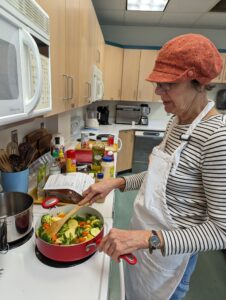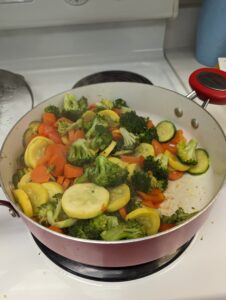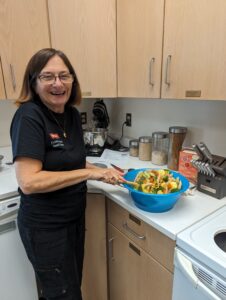More on the Med
go.ncsu.edu/readext?977256
en Español / em Português
El inglés es el idioma de control de esta página. En la medida en que haya algún conflicto entre la traducción al inglés y la traducción, el inglés prevalece.
Al hacer clic en el enlace de traducción se activa un servicio de traducción gratuito para convertir la página al español. Al igual que con cualquier traducción por Internet, la conversión no es sensible al contexto y puede que no traduzca el texto en su significado original. NC State Extension no garantiza la exactitud del texto traducido. Por favor, tenga en cuenta que algunas aplicaciones y/o servicios pueden no funcionar como se espera cuando se traducen.
Português
Inglês é o idioma de controle desta página. Na medida que haja algum conflito entre o texto original em Inglês e a tradução, o Inglês prevalece.
Ao clicar no link de tradução, um serviço gratuito de tradução será ativado para converter a página para o Português. Como em qualquer tradução pela internet, a conversão não é sensivel ao contexto e pode não ocorrer a tradução para o significado orginal. O serviço de Extensão da Carolina do Norte (NC State Extension) não garante a exatidão do texto traduzido. Por favor, observe que algumas funções ou serviços podem não funcionar como esperado após a tradução.
English
English is the controlling language of this page. To the extent there is any conflict between the English text and the translation, English controls.
Clicking on the translation link activates a free translation service to convert the page to Spanish. As with any Internet translation, the conversion is not context-sensitive and may not translate the text to its original meaning. NC State Extension does not guarantee the accuracy of the translated text. Please note that some applications and/or services may not function as expected when translated.
Collapse ▲In last week’s column I wrote about the Med Instead of Meds program developed by our nutrition team at N.C. Cooperative Extension and NC State University. It focuses on the Mediterranean Diet which involves eating the traditional way people who live in the Mediterranean region do.
Eating a Mediterranean-based diet has been proven to help protect people from
developing chronic illnesses such as cancer, type 2 diabetes and high blood pressure. Eating “the Med way” can reduce the risk of cardiovascular disease, improve eye health and protect against cognitive decline. It is also more effective than a low-fat diet for weight loss in overweight and obese individuals. The name of the program comes from the concept that eating the Mediterranean way may help people reduce their need for some medications.
This week, I’m sharing the six basic concepts of the Mediterranean Diet:
Change your Proteins. Eat primarily plant-based proteins such as beans and legumes often. Eat seafood at least three times per week. Eat white-meat poultry, such as turkey and chicken, at least twice a week.
Swap your fat. Choose olive oil. Replace solid fats like butter and margarine and other oils with olive oil. Use olive oil for cooking, in dressings and marinades. Aim to consume at least 4 tablespoons per day.
Eat More Vegetables. Get at least three servings (cups) of vegetables per day. Choose a variety of colors and eat dark green, leafy vegetables such as collards, kale, spinach and turnip greens.
Eat More Fruit. Get at least two servings (cups) of fruits per day.
Snack on Nuts and Seeds. Choose at least three-ounces of nuts and seeds per week.
Make Your Grains Whole. Choose whole grain foods such as oatmeal, quinoa, brown rice and popcorn. When choose bread and pasta, look for “whole” in the first ingredient on the ingredient list.
Rethink Your Sweets. Limit your sugar intake to no more than three servings per week.
Our Extension Master Food Volunteers were recently in the Extension Demonstration kitchen in Bolivia testing some Med Instead of Meds recipes. One they particularly liked was a Whole Wheat Pasta with Pesto and Vegetables.
This pasta is a great way to incorporate a variety of vegetables into one quick and simple meal. You can substitute any of the vegetables listed for ones that are in season and readily available. You may think the 3/4 cup of olive oil seems like a lot, but the recipe does make eight servings. This means each serving contains only about 1 ½ Tablespoons of olive oil. This amount of olive oil is needed to properly flavor and cook the large amount of vegetables. The oil along with pesto creates a light sauce for the pasta. And don’t forget…it’s good to have up to four tablespoons of olive oil a day!
Whole Wheat Pasta with Pesto and vegetables
- ½ box (approximately 4 cups) 100% whole-wheat pasta—we used penne
- 3/4 cup olive oil
- 2 – 3 garlic cloves, minced
- 1 red bell pepper, chopped into small pieces
- 1 zucchini squash, sliced
- 2 yellow squash, sliced
- 2 broccoli heads, chopped
- 5 – 6 carrots, peeled and sliced
- ¼ cup basil pesto
- 1 teaspoon salt
- ½ teaspoon black pepper
- 1 teaspoon crushed red pepper
- ½ cup shredded Parmesan cheese
Cook the pasta according to directions on box. Drain and set aside. Heat the olive oil in a large skillet over medium-high heat and add minced garlic. Add all vegetables and sauté for a few minutes until tender. Mix in the basil pesto, salt, black pepper, and crushed red pepper. Sprinkle with shredded Parmesan cheese and serve.
Makes eight servings, each about 2 ½ cups. Nutrition information: 396 calories per serving, 8 grams fiber, 11 grams protein and 27 grams of fat.
Avery Ashley, our Family and Consumer Science Extension Agent, will be teaching a
series of classes based on the Mediterranean Diet at the Rourke Library in Shallotte. These classes will be held February 12, 19, 26 and March 4 from 10:30 a.m. until noon each day. They’re calling the classes Med Not Meds. You can register at the Rourke Library in Shallotte or on the library’s website. Seating is limited.
For more information, visit the Med Instead of Meds website. They offer a series of
videos that take you through these six basic concepts in more detail. There are also
many great recipes that can help you incorporate these concepts into your everyday
eating.
Source: Med Instead of Meds, medinsteadofmeds.com
Syracuse is a Family and Consumer Science team member and can be reached at N.C. Cooperative Extension, Brunswick County Center 910-253-2610 or by email at
clsyracu@ncsu.edu






